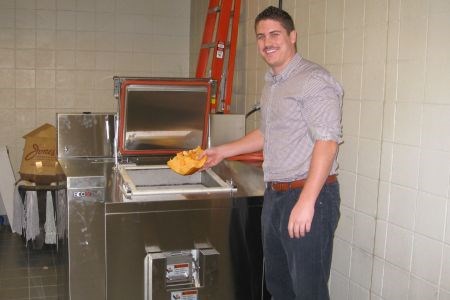Food waste is a rotten problem but a new company has a fresh solution that reduces its volume by 90 per cent.
Food Cycle Science, based in Cornwall, Ont., obtained the rights to technology developed in Korea that dehydrates and converts the organic waste into an byproduct that can be used as fertilizer.
“For the past eight to 10 months, three of us have been involved in this,” said Brad Crepeau, vice-president of sales and marketing for Food Cycle Science. “We heard about some technology being developed in Korea since food waste has been banned from going into landfills there.”
That ban is trending towards North America, with Vancouver Island banning food waste at its landfills.
Different sized machines, installed onsite, can handle 55 pounds to 3,300 pounds of food waste and complete the process in six to 20 hours.
The byproduct that is left is a dry humus-like material that can be utilized as a soil amendment.
“It's a total solution for food waste,” Crepeau said. “It's in-vessel so there are no odours or leaching problems and there is a 90 per cent reduction. If you put 1,000 pounds of waste in, you get 100 pounds of an organic mulch back.”
The company successfully applied to participate in the Ontario government's GreenFIT strategy and a Food Cycler machine was installed at the Willet Green Miller Centre in Sudbury.
The strategy involves finding companies with innovative technologies that have an economic and environmental impact within government.
“A host ministry takes the technology and demonstrates it for a period of time and monitors results. If the results are positive, then it can be incorporated into other ministries,” Crepeau said.
Sara McIlraith, a geoscience information applicationist at the Willet Green Miller Centre, is part of a volunteer group at the building looking for ways to improve waste management.
“We were put in touch with Food Cycle Science and a machine was installed,” she said. “Our building houses more than just the ministry (of Northern Development and Mines) so we have made posters and we are handing out compost bins.”
The byproduct is stored in garbage pails and there won't be any problem using it.
“People have been taking what they need and others are eagerly waiting to get their stash,” she said. “It really is exciting.”
Being part of GreenFIT is a “huge win” for the company, Crepeau said, and a number of different ministries have been inquiring about it.
“That has an incredible upside potential if it turns out as we expect it to,” he said. “If the economic and environmental benefits are shown, it carries a lot of weight over to the private sector.”
According to a government website, “participating in GreenFIT will provide an ideal platform for companies to demonstrate the effectiveness of their products to other potential customers in local and international markets.”
The return on investment (ROI) for a company utilizing a Food Cycler comes from transportation costs.
“It is often difficult for commercial establishments to get their organic waste picked up,” Crepeau said.
A basic machine costs about $27,000 and the company's case study involved transportation costs – hauling the organic waste to a landfill – of $700 a month.
Another option is to lease the Food Cycler for $550 a month and after five years, the machine is owned by the company leasing it.
“You are spending $550 a month, and saving $150 a month in transportation costs, and after five years you own the machine and save $700 or more in transportation costs,” Crepeau said. “By leasing to own, you realize instant savings.”
A natural composting process can take up to three months, but it emits methane gas which is 25 more times harmful, he said, than carbon dioxide emissions from cars.
“Composting still has an impact on our carbon footprint because of the methane gas. Food bins also have odours and attracts animals. All that can be eliminated with our machine which is installed onsite.”
Currently, the company has clients in Canada and the U.S. including hospitals, resorts and commercial cafeterias. The technology can by used by any business that generates organic waste, including municipalities.
“There's a large market,” Crepeau said. “And we are really excited about developing the Canadian market.”




